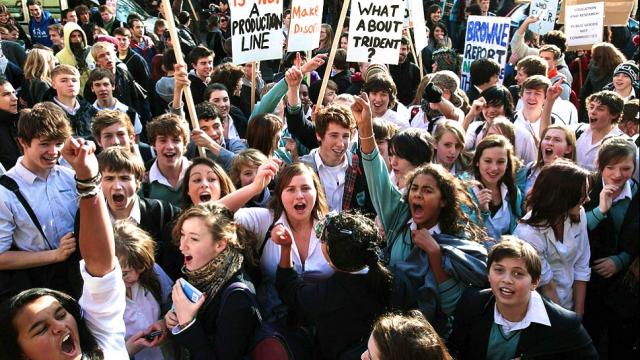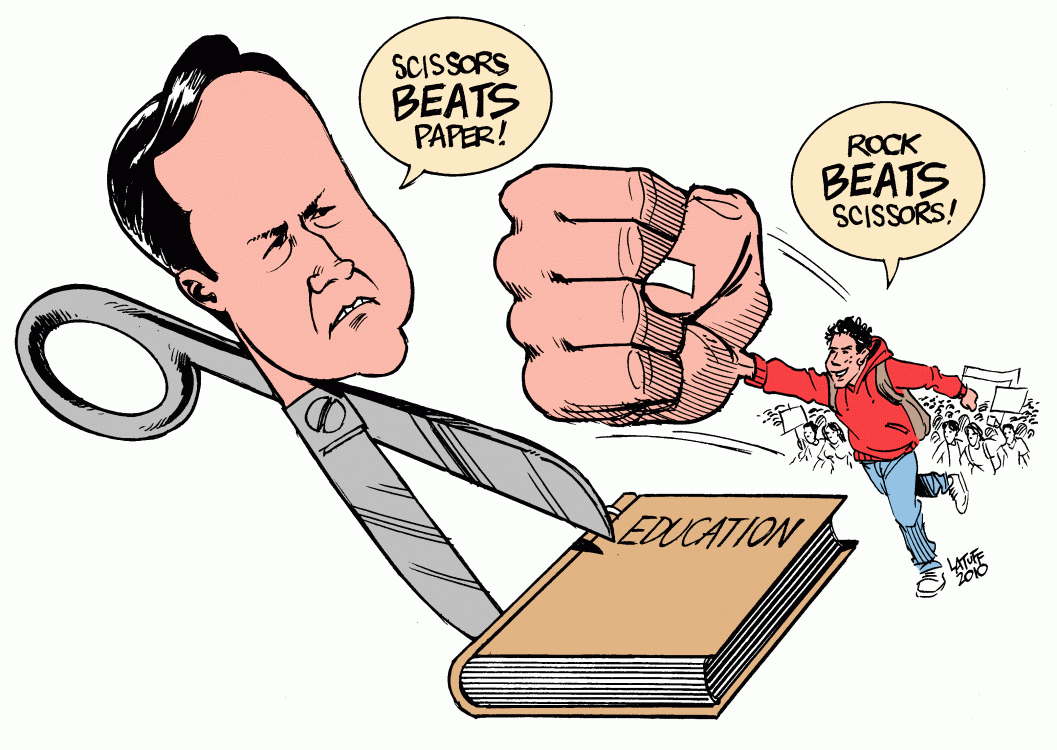
“Determining education access with money means young peoples’ starting points are based on their parents’ wealth," David Suber, a student union representative from the School of Oriental and African Studies (SOAS) at University of London, tells me. "Free education helps levels inequality across society, giving people equal access to the same tools and knowledge.”
Georgie Robertson, another elected SOAS student rep, adds: “Paying fees to attend university also turns students into consumers and universities into privatized businesses. The purpose of learning changes from a broad social good to become [one] based on creating profits.”
I interviewed Robertson and Suber during a banner-making session ahead of next week's U.K.-wide demonstration calling for free education, which takes to London’s streets on Nov. 19. The student campaigners have already taken part in pressuring school management to give Justice for Cleaners.
Now, their focus is centering directly on education costs. The trebling of the tuition fee cap in 2012, to £9,000, is cornerstone of a broader shift in British universities, which are increasingly run with corporate management structures, with high salaries for the big bosses. Rather than focusing on quality learning, these managers push for increased student numbers to advance revenue stream.
Measures to achieve this include pumping money into new logos and flashy branding, and building new infrastructure – all at the cost of reduced staffing, which hits teachers and students alike.
Universities across Britain are moving towards outsourcing workers, cutting the range of courses and relying on PhD students to take on work they're not properly paid for. Courses where units are especially being dropped include history, music, languages and the study of religions.
In parallel with the deterioration in quality of learning, Suber asserts the shift in education reinforces class privilege.
“Many professions require a degree from a top university that are mainly full of kids with rich parents," he said. "In effect, these universities are less about knowledge, instead places where you get a piece of paper with the right university stamp to get a lucratively paid job.”
Opposing this neoliberal trend, the Nov. 19 free education demonstration is expected to turn out thousands of protesters onto London’s streets, and nationwide.
“There is a really strong will behind this demo, with universities, colleges and schools across the country showing strong support,” Robertson said.
“The [student] movement was disheartened in 2010, after a mass mobilization that failed to stop the government [trebling] tuition fees. But now people have seen how privatizing education is ruining the system, and this is galvanizing a movement. People can also look to Scotland and Germany, which both maintained free education.”
Germany’s success in rejecting plans to charge fees for students has been attributed to building a broad society-wide movement. I asked Robertson to what extent these links are being made in the U.K.
“I think it is crucial that we reach out and link attacks on education to the whole austerity agenda," she replied. "Students and workers need to unite and fight, as neither of us can win without the other.”
Those links are already being made and signs of solidarity are there, she added. But they need to be increased. The demonstration’s title – "Free Education – No Cuts, No Fees, No Debt!" – shows it is not just about tuition fees, but an education system overall that is in peril.
The National Union of Students (NUS) at first gave full support to the demonstration, recognizing its wider challenge to austerity. The Union has been criticized for not standing up for free education for all, but earlier this year its full membership voted to support the demonstrations, marking the first time the Union has called for free education since 1995.
Recently, though, NUS leaders have pulled their backing. The reasons for this, many claim, are because of concerns over a lack of stewards, risk assessment, liability insurance and other access issues. Evidence that these issues seemed to be in-hand, however, raises questions about whether there are other reasons the NUS leadership chose to back out its support.
A possible explanation is that the NUS hierarchy has close ties to the Labour Party, whose pro-austerity agenda originally introduced tuition fees in 1998, increasing them again in 2003.
The NUS president who made the decision, Toni Pearce, is a Labour Party member, as are four out of the five NSU vice presidents. Since the Labour Party doesn't stand for free education, it would likely be embarrassed by a large turnout on Wednesday.
Indeed, the frequent inability of unions to take a strong stand against austerity and neoliberalism is well documented. But there now seems to be a shift in the NUS away from its ties to the pro-establishment New Labour position. In addition to a majority of NUS members now supporting free education, the demonstration is still supported by NUS Scotland, NUS Black Students Campaign, and the International and London branches.
The last major London mobilization of students was the Cops Off Campus action, a response to violent police suppression of student protests, which occurred just under a year ago.
Now, the movement is preparing for possible police brutality again. Titles of books such as Naomi Klein’s Capitalism vs. the Climate and Noam Chomsky’s Manufacturing Consent are being painted on cardboard and foam faces to be used as props in the protest. The straps behind them, however, not only make the props easy to carry, but they can also be used as a possible defense mechanism against police batons. The "book bloc" technique originated in Rome, Italy, in 2010.
I asked Robertson and Suber what lessons today's student movement should take away from the Cops Off Campus mobilization. Robertson said last year’s demonstrations showed how quickly and spontaneously movements can escalate. "It shows just how many young people care and are in tune with events," she said, "and that we can reach the same level of protests as we see on the continent.”
But Suber pointed out a challenge in mobilizing for free education rather than against police violence. “Police violence was visible and real, but it’s different with free education," he said. "You have to imagine the injustice, like those who are not attending university. It is our job to show people this to get them out on the streets.”
Suber and Robertson are also pushing another project that challenges the corporate shift in education, called Democratise SOAS, which aims to make the SOAS institution rethink how it is run. In this campaign, there are regular student and staff forums, often with hundreds of staff, students and academics in attendance, giving space for proposals to be pushed from the bottom-up – a signaling a direct challenge and alternative to the corporatization of university management.
Robertson explained that Democratise SOAS and the free education movement are about re-imagining education, rather than returning to a vision of academia before fees. “We don’t just need to demolish the financial barriers to education – we need to look at all the barriers to equality. For instance, currently there is a massive gender pay gap, and of 20,000 professors nationwide only 85 are black,” she said. “Free education needs to be free, accessible, representative, inclusive and democratic.”
3 WAYS TO SHOW YOUR SUPPORT
- Log in to post comments
















